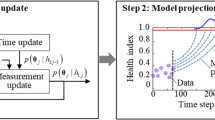Abstract
As a prerequisite for effective prognostics, the goodness of the features affects the complexity of the prognostic methods. Comparing to features quality evaluation in diagnostics, features evaluation for prognostics is a new problem. Normally, the monotonic tendency of feature series can be used as the visual representation of equipment damage cumulation so that forecasting its future health states is easy to implement. Through introducing the concept of ranking mutual information in ordinal case, a monotonicity evaluation method of monitoring feature series is proposed. Finally, this method is verified by the simulating feature series and the results verify its effectivity. For the specific application in industry, the evaluation results can be used as the standard for selecting prognostic feature.
Similar content being viewed by others
References
Mahamad A K, Saon S, Hiyama T. Predicting remaining useful life of rotating machinery based artificial neural network [J]. Computers and Mathematics with Applications, 2010, 60(4): 1078–1087.
Heng A, Zhang S, Tan A C C, et al. Rotating machinery prognostics: State of the art, challenges and opportunities [J]. Mechanical Systems and Signal Processing, 2009, 23(3): 724–739.
Tran V T, Yang B S. An intelligent condition-based maintenance platform for rotating machinery [J]. Expert Systems with Applications, 2012, 39(3): 2977–2988.
Camci F, Medjaher K, Zerhouni N, et al. Feature evaluation for effective bearing prognostics [J]. Quality and Reliability Engineering International, 2013, 29(4): 477–486.
Medjaher K, Camci F, Zerhouni N. Feature extraction and evaluation for health assessment and failure prognostics [C]// Proceedings of First European Conference of the Prognostics and Health Management Society. Dresden, Germany: Anibal Bregon, 2012: 111–116.
Peng H, Long F, Ding C. Feature selection based on mutual information: Criteria of max-dependency, max-relevance, and min-redundancy [J]. IEEE Transactions on Pattern Analysis and Machine Intelligence, 2005, 27(8): 1226–1238.
Hu Q H, Guo M Z, Yu D R, et al. Information entropy for ordinal classification [J]. Science China: Information Sciences, 2010, 53(6): 1188–1200.
Zhao X M, Zuo M J, Patel T. EMD, ranking mutual information and PCA based condition monitoring [C]// Proceedings of the ASME 2010 International Design Engineering Technical Conferences. Montreal, Canada: American Society of Mechanical Engineers Press, 2010: 1–6.
Author information
Authors and Affiliations
Corresponding author
Additional information
Foundation item: the Test Technique Research Project (No. 2014SZJY3101)
Rights and permissions
About this article
Cite this article
Zhao, Cy., Liu, Jj., Ma, L. et al. Monotonicity evaluation method of monitoring feature series based on ranking mutual information. J. Shanghai Jiaotong Univ. (Sci.) 20, 380–384 (2015). https://doi.org/10.1007/s12204-015-1641-8
Received:
Published:
Issue Date:
DOI: https://doi.org/10.1007/s12204-015-1641-8




